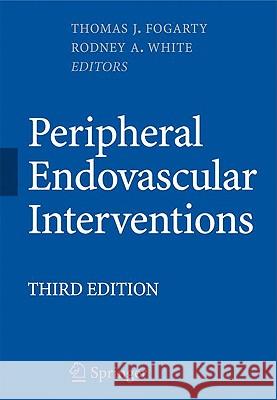Peripheral Endovascular Interventions » książka
Peripheral Endovascular Interventions
ISBN-13: 9781441913869 / Angielski / Twarda / 2010 / 512 str.
This book is a comprehensive review of the rapidly advancing field of endovascular therapy, written by internationally recognized authorities in the field, many of whom are the innovators of the techniques and devices involved. Broad in scope, topics covered range from how to obtain training in approved endovascular techniques to promising new lines of investigational therapies. Reflecting the operative nature of many of the new endovascular therapies, this book is somewhat unique for an endovascular text in the strong representation of surgeons among its authors. Purpose: The purpose is to train and update physicians with diverse levels of experience and from a variety of specialties in established, new, and still evolving endovascular techniques. Given the wide variation in expertise among different specialties interested in performing these procedures, and acknowledging that different specialties lack skill in different aspects of various procedures, a book such as this is badly needed. The goals are accomplished by providing broad overviews of the basics for those with little experience and in-depth presentations of advanced topics for more skilled physicians. Audience: The audience includes vascular surgeons, who will take particular interest in the coverage of endovascular equipment and basic percutaneous techniques, and interventional cardiologists and radiologists, who have had little previous exposure to the operative aspects of endovascular therapy discussed in detail in this book. From the preface to the second edition: Catheter-based diagnosis and treatment of vascular diseases has evolved over the last several decades, with a recent increase occurring in the utility of the therapeutic methods. This development has been stimulated by several factors including miniaturization of interventional devices and imaging technologies, and an emphasis on the utilization of minimally invasive, cost-effective treatments that reduce the economic impact of health care delivery. As part of this evolution, the development and adaptation of new interventional techniques and devices has produced a continual need for updating and training physicians in several subspecialties regarding the use of these methodologies. This requires not only adapting the technologies to current clinical practice but also establishing educational training curriculum in subspecialty fellowship programs. Because endovascular technologies are of multispecialty interest, a review of the entire scope of fundamental information regarding each aspect of the field is required to furnish a comprehensive review that will provide specific utility for individuals from different disciplines. For this reason, we have undertaken the development of this text to satisfy two goals. The first is to provide a broad overview of the entire range of topics for clinicians with little or no background relevant to the subject matter. Secondly, those with some familiarity will find definitive informational material to allow adaptation of endovascular technologies to their current clinical practice. To adequately understand and safely use catheter-based interventional therapies, knowledge of a number of topics beyond the clinical indications and techniques for applying endovascular methods is required. A thorough understand of the pathophysiology of vascular disease, safety issues regarding interventional devices and imaging methods, and a comprehension of fundamental biomaterials concepts is needed. These topics are addressed in detail and represent relatively mature aspects of this field that are otherwise characterized by continual change in devices and techniques as the field expands.











